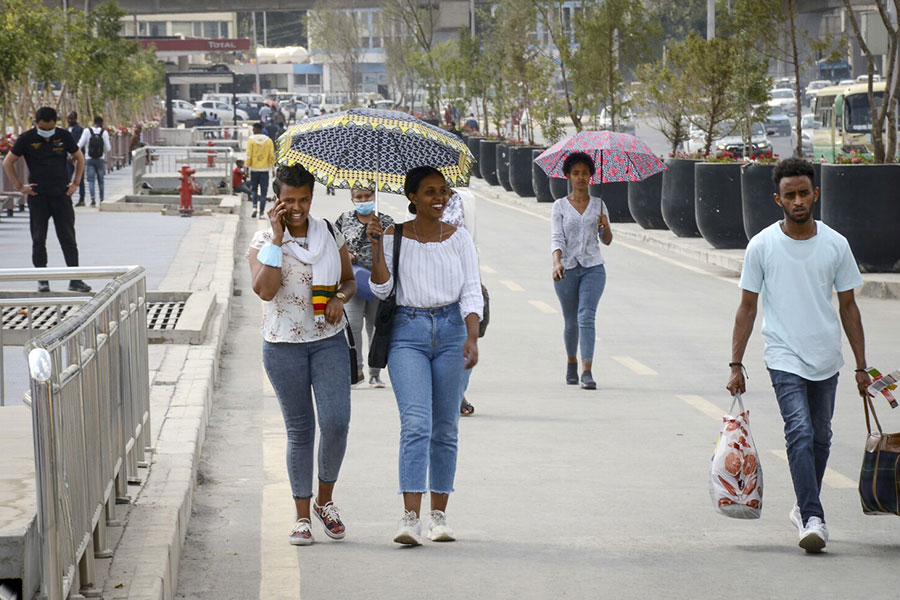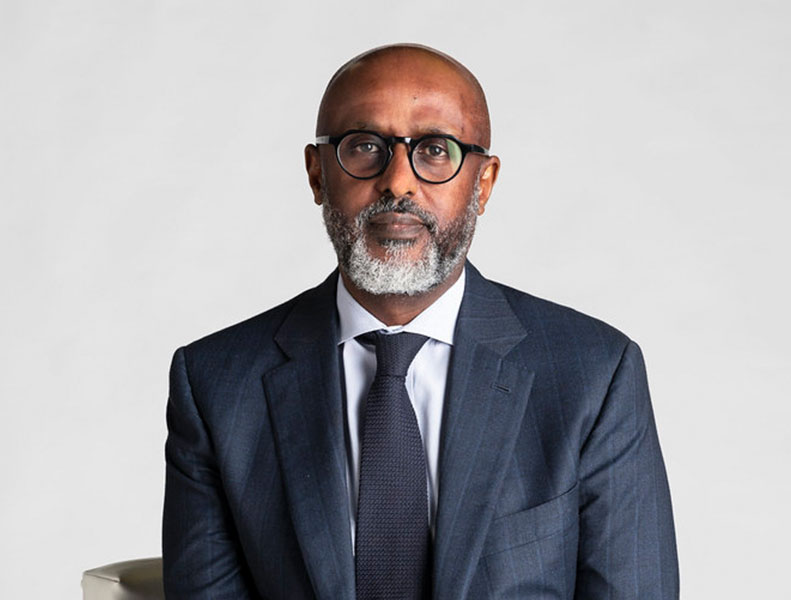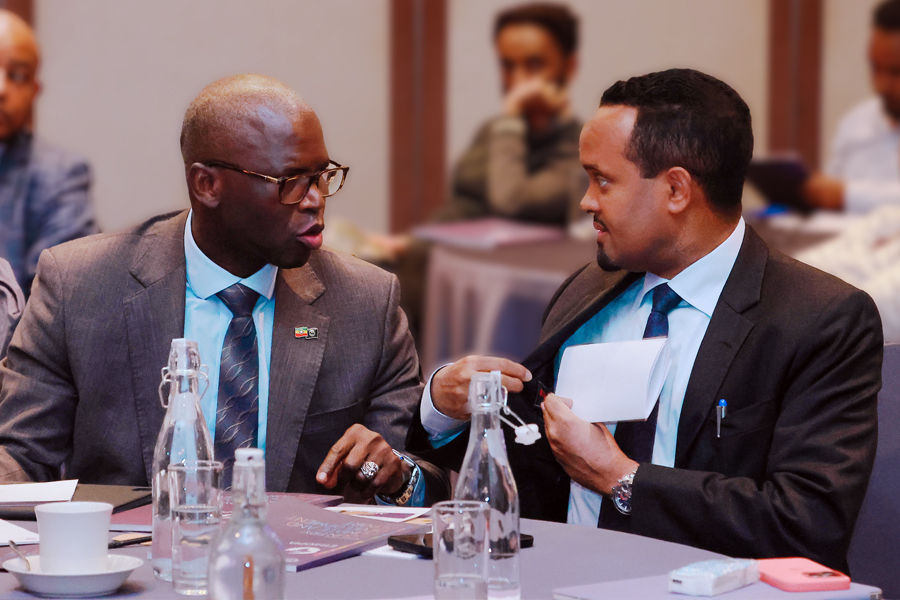
Radar | May 18,2024
About 40 young recruits in their 20s gathered last Sunday on the fifth floor of the Blue Sky Hotel in a neighbourhood popularly known as the Haya Arat area.
The training seminar was organised for alternative and novel schemes making individuals "successful" in business. A wheedling affiliate treats the incoming recruits at the door leading past eager eyes to a table at the hall's centre. Permission to attend was granted following a 200 Br payment made electronically to one of the affiliates before the event.
The company, Crowd 1, prides itself as "the largest crowd marketing company in the world". Crowd 1 has been active in Ethiopia for over four years. It is an offshoot of a Dubai-based crowd-marketing company without a permanent residence record. It operates through affiliates and occasional gatherings at hotels and guesthouses.
Mesfin Abate attended one of these gatherings after he was lured by a friend he called Mihiret. A day after his introduction, Mesfin participated in a training held at a guesthouse around the Bole area. Captivating and inspirational sales pitches hypnotised the 29-year-old accountant into buying one of the obsolete packages with exotic names such as Black, Gold, Platinum and Titanium. To his regrets, he witnessed his 5,000 Br go up in smokes two years ago after joining Crowd 1.
With the initial Black package referred to as a means to join the affiliated pyramid, Mesfin tried to offer the same package within his close circle. Payments were made through "sponsor links" offered by existing members to recruits. These electronic links are the gateway where higher-ups within the network authenticate commission payments. Mesfin was told that the more people buy entry packages, the higher commission the sponsor link owner would make as an "affiliate".
"I was offered a shortcut to the riches," he told Fortune.
A closer look at the company and its marketing structure reveals a familiar pattern that appears broad at the bottom and narrows as it goes up. It resembles a troubling marketing network, a.k.a pyramid scheme. It lures newcomers through quick payments from earlier members in the network without offering tangible products or services on sale.
It was invented by Charles Ponzi in the 1920s, who promised half of the returns on investment through the mail. He was an Italian man who operated primarily in the US and Canada, making off close to 15 million dollars. Complex commission fee structures, promises of passive income, and the absence of a viable revenue model mark most pyramid schemes. The biggest Ponzi scheme in history was orchestrated by Bernie Madoff, who had a stock exchange firm worth 64 billion dollars.
Ethiopia has had its fair share of companies that exhibited these troubling signs. A company with the moniker Tiens had its business license suspended six years ago by the Consumer Protection Agency, citing allegations of a pyramid scheme. The consumer protection law prohibits applying or attempting a pyramid sales scheme by claiming an additional reward based on the number of clients.
Upon learning of a Ponzi company named "FIAS", which misled thousands into an entry to a multi-marketing structure that vanished with millions of funds, Mesfin claimed that he did not want to exert an effort in a similar undertaking that took advantage of people with little economic safeguards.
"My conscience weighed on me," he told Fortune.
FIAS was a pyramid scheme that used Telegram to recruit individuals quickly and vanished into thin air after swindling millions from unsuspecting victims last year.
Mesfin says he has cut contact with the friend who lured him into buying the package with rumours that she had recently visited Dubai to reward her efforts. The company had packed up and left its location a couple of months ago.
The exotic names for the packages offered by Crowd 1 have elevated to Earth, Air, Water and Fire, ranging from the lowest package, Earth, valued at 7,279 Br, to an executive Fire package for 142,151 Br. Despite slight increases in the price of the packages, the commission structure has changed very little. One of these models is dubbed the "fear of loss" bonus, where someone that bought a package gets a return of the initial purchase upon bringing in four recruits within two weeks.
Genet Birhanu attended the Blue Sky Hotel seminar on January 1, 2022.
She had bought the "Air" package for 14,000 Br five days before the seminar. The ambitious young woman from Adama (Nazareth) town in Oromia Regional State was enthusiastic about recruiting new members, labouring under the illusion that her initial purchase would be reimbursed. She was huddled amongst the latest recruits while seasoned trainers ranking from "starter" to "ambassador" circled them.
Ranking for long-timers is based on the number of customers under their sponsor links.
After buying one of these packages, the sponsor would send a plagiarised obscure video clip that preaches vague tactics for becoming a skilled marketer.
Those on the company's side blame misunderstanding and ignorance by the public about the nature and goodness of these companies.
Rhobot Elias, a young woman in her 20s, was one of the trainers at the Blue Sky Hotel seminar. She had been living off Crowd 1 for about a year and claimed that the bad publicity around Crowd 1 resulted from ignorance.
"People only talk about the negatives," she said.
The young woman's adamant attitude is palpable. Using a more tangible business to make her point, she enquired about whose fault it would be if a boutique owner went bankrupt. She compared Crowd 1 to the use of social media in a long-winded speech about the collective lack of technological understanding.
Crowd 1 may not have a local office, but it is working to have one, according to Rhobot.
"We would be happy to pay taxes," she said.
Rhobot appears as a salesperson who does not try to understand the extent. She argued that "their" company offers products and does not rely on recruiting to make money. She is confident that she will work for the company overseas if the local branch closes.
The Swedish Jonas Eric Werner, the founder of Crowd 1, has been connected to digital pyramid schemes in several countries. Spinglo Synkronice was the name of his last failed multi-marketing service. It claimed to be an upcoming online networking platform tied to the stock market and had a complex commission payment structure before fading. He can be seen uttering the same points fed to Crowd 1 affiliates in a video released in 2011 when he was managing the company.
Lately, he occasionally appears at large gatherings in Dubai, telling an over-excited group to "share the opportunity."
A host of company logos behind him, "Miggster and Planet IX", all lead to poorly designed websites that offer no valuable services. The "Miggster", a gaming site, rewards players based on how many guests they bring in. The offering of these products appears as the ideal cover to usher in a global multi-marketing scheme.
The chief networking officer of Crowd 1, Kenny Nordlund, was a significant player in OneCoin. This global cryptocurrency-based scheme raised four billion dollars before being shut down by authorities in Norway.
The expansion of social media blurs the line between legal online marketing and the strange apparition recently trending as affiliate marketing.
Nurhassen Mensur is a digital finance expert and manager at Yenepay, a company that has been offering digital payment tools for nearly a decade. He sees poor literacy in technology in countries like Ethiopia behind the increase in potential victims.
"Crypto can serve as a bridge to transfer large funds to the black market," the expert said.
Virtual products like non-fungible tokens (NFT), tied to crypto wallets, are obscure and difficult to verify even for tech-savvy people, which makes them ideal tools to defraud individuals, according to Nurhassen.
"There is always a new abstract digital service," he told Fortune.
He urged financial intelligence services and authorities in charge of trade bureaus to serve as safeguards against digital pyramid schemes. The Communications Officer at the Financial Intelligence Services said that the Agency would go after any business provided sufficient cause for illicit financial transactions is established.
The governments of Namibia, Gabon, Ivory Coast, Mauritius, and New Zealand and members of the Common Market for Eastern and Southern Africa (COMESA) have either issued warnings to the public on Crowd 1 or have outright banned it, claiming it was indeed a pyramid scheme. BBC Africa investigated Crowd 1 back in 2020, similarly concluding it was a pyramid scam.
Despite its visible presence in Ethiopia, the authorities are unaware of its activities. Tilahun Getachew of the Addis Abeba Consumer Protection Agency does not recognise the company, asserting that the Agency has no mandate over an entity not registered by the Trade Ministry or regional bureaus.
Further inquiries are contingent on finding a tax identification number (TIN) and business license registered under a different name, according to Adem Nuri, head of the Addis Abeba Trade Bureau. However, he has no record of a company incorporated under Crowd 1.
"Running a business without a trade license is illegal," Adem told Fortune.
No registration for a company incorporated under Crowd 1 was issued, disclosed Kumneger Ewnetu, communications director at the Ministry of Trade & Regional Integration (MoTRI).
"Short-term gains are usually fraudulent," she said.
A World Bank report released in 2017 assessed Ethiopia's consumer protection in the financial sector and suggested the establishment of directorates within the central bank to institute digital consumer protection.
Crowd 1 continues to expand, boasting close to 50 million members worldwide; it operates in Ethiopia incognito. The funds collected from unsuspecting individuals like Mesfin and Genet challenged the pyramid upward into the pockets of those at the top, leaving citizens penniless.
PUBLISHED ON
Jan 07,2023 [ VOL
23 , NO
1184]

Radar | May 18,2024

Featured | Sep 06,2020

Fortune News | Jul 13,2020

View From Arada | Mar 12,2022

Fortune News | Oct 23,2021

Commentaries | Jun 27,2020

Fortune News | Mar 02,2024

Editorial | Jun 22,2024

Radar | Feb 02,2019

Life Matters | May 25,2024

Dec 22 , 2024 . By TIZITA SHEWAFERAW
Charged with transforming colossal state-owned enterprises into modern and competitiv...

Aug 18 , 2024 . By AKSAH ITALO
Although predictable Yonas Zerihun's job in the ride-hailing service is not immune to...

Jul 28 , 2024 . By TIZITA SHEWAFERAW
Unhabitual, perhaps too many, Samuel Gebreyohannes, 38, used to occasionally enjoy a couple of beers at breakfast. However, he recently swit...

Jul 13 , 2024 . By AKSAH ITALO
Investors who rely on tractors, trucks, and field vehicles for commuting, transporting commodities, and f...

Oct 25 , 2025
The regulatory machinery is on overdrive. In only two years, no fewer than 35 new pro...

Oct 18 , 2025
The political establishment, notably the ruling party and its top brass, has become p...

Oct 11 , 2025
Ladislas Farago, a roving Associated Press (AP) correspondent, arrived in Ethiopia in...

Oct 4 , 2025
Eyob Tekalegn (PhD) had been in the Governor's chair for only weeks when, on Septembe...